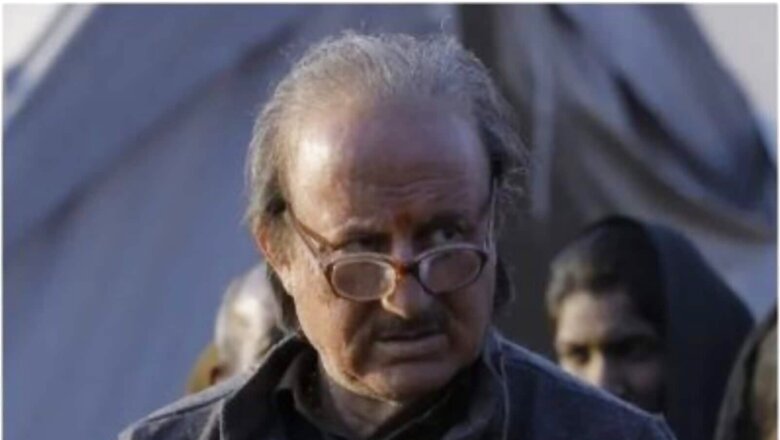
views
Where do we start with The Kashmir Files and the horrible memories that have resurfaced because of it? Do we talk about the systematic disenfranchisement of Kashmiri Pandits and the politics that preceded and led up to the genocide? Do we talk about the genocide? Do we talk about the whitewashing of that genocide through a concerted and systematic effort? Do we talk about how the worst and most sadistic of those perpetrators were hailed as “Mahatma Gandhis” and “Nelson Mandelas”? Or do we talk about the intense ongoing efforts to gaslight victims, blame them for their victimhood and call them bigots.
In India, all these conversations were happening, but in their own silos and sequenced differently. What Vivek Ranjan Agnihotri’s movie has done is that it has synchronised all these conversations, giving genocide apologists nowhere to run and laying their hypocrisy bare for all to see.
An alleged journalist, for instance, whose work was rubbished by the Supreme Court as having no evidentiary value would have you believe that her death profiteering is journalism, but that Agnihotri making a movie after painstaking documentation of an actual genocide is somehow Islamophobic bigotry. Meanwhile, an alleged fact-checker, known to regularly delete tweets of his fact-checking gone wrong, would have you believe that sloganeering in theatres is bigotry while terming a deliberate ethnic cleansing as a ‘tragic exodus’. Yet another alleged researcher, whose only ticket is his religion and who claims bylines in major Indian and international dailies, remarked during the Hijab row that this was a necessary public shaming of Hindus because only shaming would force a change of attitude. However, when confronted with the realities of the Pandit Genocide, he believes that any attempt to shame is Islamophobic. Notice the common thread here? All these “celebrated”, allegedly “mainstream” “liberal” Muslims have absolutely no qualms denying a genocide and defending its perpetrators.
Also Read: No, Jagmohan Didn’t Send Kashmiri Pandits Out. A Sinister Ideology Did
There are, however, insidious criticisms masquerading as valid academic criticism of the Pandit Genocide that need to be addressed. The Kashmir Files addresses these only peripherally. First is that only a few dozen Pandits were actually killed and the “proof” is a reply to an RTI where the Kashmir police claim that only 89 were killed. Notice the sleight of hand here — the fact that only 89 FIRs were registered is interpreted as the number of deaths. The Kashmiri Pandit Sangharsh Samiti led by Sanjay Tikoo has painstakingly documented around 1,200 Pandits who simply went missing during this period — presumed dead, but no FIR filed. They want you to believe that when the administration has collapsed and local bureaucrats and police are openly helping terrorists identify and kill Hindus, Hindus would obviously go to these same policemen to file FIRs instead of running for their lives.
This brings us to the second part of this “quackademic” apologia advanced by the University of Uppsala: that ethnic cleansing cannot happen without the complicity of the state. Partially correct. But note how this is twisted to turn it into the fault of the Indian state. The Indian “state” had literally ceased to exist when the murders peaked and the genocide began. Serving state bureaucrats of Kashmir signed a letter asking India to leave and declared themselves Pakistanis. The police and state bureaucracy literally joined the JKLF (Jammu Kashmir Liberation Front) terrorists providing them with hit-lists of Hindus.
Jagmohan was deputed to stabilise the situation well after the state apparatus had completely collapsed. Where else have we seen these parallels? Rwanda, partially, where the killing of the president and the collapse of the administration sparked the militias to initiate the horrific genocide. But the more germane example is Kosovo — where the Serbs killing around 1,500 Islamist terrorists of KLA and their sympathisers sparked a full-blown exodus of thousands of Kosovans assisted by the Serbian state. The difference in Kashmir was that central authority had completely collapsed and the local police, bureaucrats and the Jamaat-e-Islami were in charge.
Mind you, there is collective guilt in Kashmir — in all the survivor accounts as well as Bitta Karate’s interview by Manoj Raghuvanshi, where he himself admits that the average Muslim Kashmiri used to come out on the street and raucously support the torture-murder of Pandits. This is but a small vignette of what Kashmiri Pandits went through — to be threatened, betrayed, tortured and killed. To see the state collapse and the rump state in league with those who wanted to kill you. To be unable to file an FIR for fear that the police will hand you over to be killed (like the Palghar Sadhus we saw on video). To be made to live off a mere Rs 600 a month while your killers were given Rs 1.5-2 lakh for surrendering. To have your academics whitewash your story, your prime minister talk peace with your murderer, your TV channels declare them youth icons, your industrialists schmooze them, and to be accused of being a hate-filled bigot if you ever open your mouth.
Ultimately while The Kashmir Files may have brought every closet saffron sympathiser out of the closet, its greatest achievement is that it has resplendently brought every closet Jihadi out of the closet as well. It has shown us that the greatest threat to India has never come from the bearded, pious, fundamentally decent Deobandi cleric who is a man of his village, but rather from people who like the pork-eating, alcohol-swigging Jinnah claim to be liberal, with a global outlook and an ability to charm the West, but will have no qualms sentencing millions to death and displacement to achieve their Islamic utopia under the guise of liberalism.
The writer is a senior fellow at the Institute of Peace and Conflict Studies. The views expressed in this article are those of the author and do not represent the stand of this publication.
Read all the Latest Opinion News and Breaking News here



















Comments
0 comment